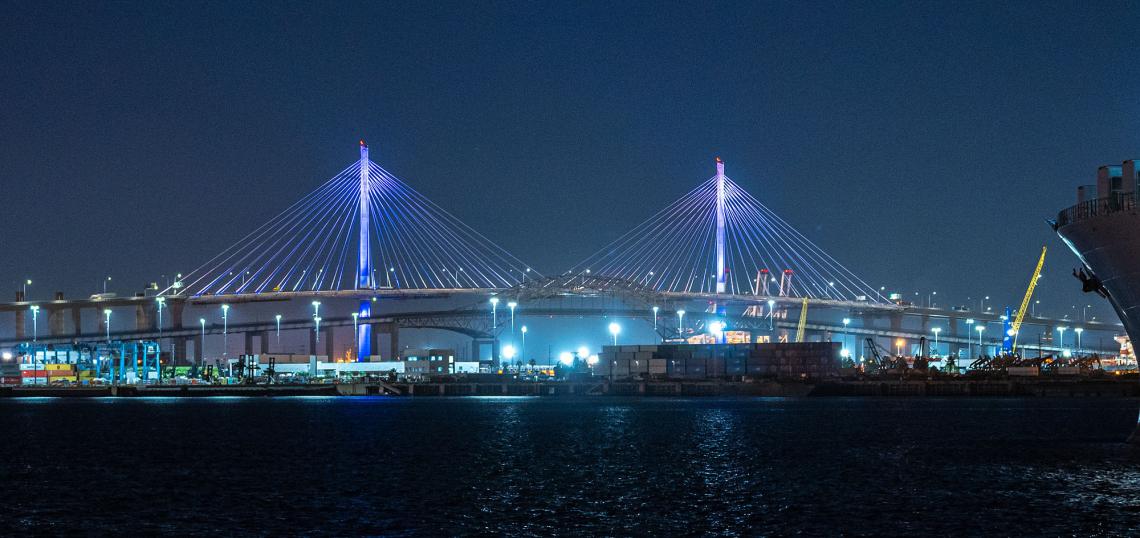Things to read from the past week:
- New Bridge Lighting Launch: Long Beach's $1.5-billion Gerald Desmond Bridge gets a literal glow-up (New GD Bridge)
- $130,000 for an 8-foot-by-8-foot shed? That’s what L.A. is paying in a bid to house the homeless: "In other cities, 64-square-foot aluminum and composite sheds are being used as quick and inexpensive emergency shelter for homeless people....Not in Los Angeles. Here, plans to employ the minimalist structures, known as “tiny homes,” have blossomed into expensive development projects with access roads, underground utilities and concrete foundations — and commensurate planning delays." (LA Times)
- Meet Suely Saro, the first Cambodian American elected official in Long Beach history: "When she is sworn in Tuesday, Saro, 40, will become the first Cambodian American council member in the history of Long Beach, which has since the 1980s hosted the nation’s largest concentration of Cambodian American refugees. She may also be, as she has stated, the first Cambodian American elected to office in California." (LA Times)
- Baldwin Hills Dam Breaks Los Angeles December 14, 1963: 57 years ago this week - the failure of the Baldwin Hills Dam kills five and destroys more than 270 homes (History Comes to Life YouTube)
- Everyone thinks COVID-19 destroyed the office. But that’s not the whole story: "But there is one bright spot in the dark office scene, according Nick Romito, CEO and cofounder of VTS. The biggest comeback has been in Los Angeles, where demand is only about 26% lower than what it was in February. 'Most other markets in the past 30 or 60 days have started to drop off a bit, but L.A. has climbed back to almost 70% of where they were pre-COVID,' says Romito. He suggests the demand is coming from the creative community in Hollywood, as well as tech companies in the region that have been leasing at rates comparable to before the pandemic." (Fast Company)
- What Representative Fudge as HUD Secretary Could Mean for Housing?: "Fudge's role as the mayor of a suburb with a low level of homeownership and an above-average poverty rate may make her sensitive to the issues facing renters throughout America. She voted for the HEROES Act and has been an advocate for programs to support the poor. She has introduced a resolution to create a 'Poverty Bill of Rights.' That bill includes a right to safe and affordable housing." (Millionacres)
- What Secretary Pete Could Mean for the US DOT: "Buttigieg was a surprising choice for the post, which experts speculated would go to a transit or transportation veteran like New York City Department of Transportation Commissioner Polly Trottenberg or a major city mayor who had dealt with large-scale federal transportation grants, such as Los Angeles’s Eric Garcetti. But others were thrilled to see a Midwestern former mayor take the helm of an agency that has not always recognized the unique challenges of ending car dependency in transit-poor cities where most Americans live — and argued that his vision for transportation reform was far bigger than South Bend’s modest 18-route bus network." (Streetsblog USA)
- California population growth hits record lows, stifled by COVID-19, continued exodus: "The California Department of Finance, which monitors the state’s population data, found that between July 1, 2019, and July 1, 2020, California saw a net gain of only 21,200 new residents — a 0.05% growth rate not seen since 1900. As of July, the state’s total population was 39.78 million." (LA Times)
- Motel Dwellers Say They Were Forced Into Homelessness—So The Motel Could House Homeless People: "Several families believe they were illegally evicted and denied rights like relocation fees. Others say they were locked out of their rooms this month or that management didn't give them any notice about the sale....Now, county officials have delayed the sale, while they sort out if occupants have rights of residency — and if not, where they will go." (LAist)
- How the pandemic threatens to destroy America's three remaining Japantowns: "In the U.S.'s three remaining officially designated Japantowns — in San Francisco, Los Angeles and San Jose, California — small businesses like PikaPika have struggled to stay afloat, jeopardizing the survival of the enclaves that have been informal safety nets for generations of low-income Japanese immigrants. While merchants across the country face difficult decisions about whether to stay open, the pandemic is intensifying long-standing pressures in Japantowns that could lead to the collapse of the already declining historic neighborhoods." (NBC)
- You're Fertilizing Invasive Grasses With Your Car, Making Wildfires Worse: "Among the Iliad-sized list of things to which we can attribute California's worsening wildfires, you've probably thought of the obvious — climate change, the need to do more prescribed burns, and building homes and infrastructure in places that easily catch on fire....But there's another often-overlooked factor that may also be making wildfires worse: air pollution. Specifically, something called nitrogen deposition." (LAist)
- Construction workers have highest asymptomatic COVID positivity rates, Curative study finds: "One reason why COVID-19 spreads so quickly is because a lot of people who have it never show symptoms — between 20-40% of all cases. A new report finds that certain professions seem to have higher rates of asymptomatic infection than others. Construction workers, who are deemed essential, top that list." (KCRW)
- “Countywide Emergency Order”, New Restrictions And Closures Being Considered As L.A. Becomes Ground Zero Of Covid-19 Pandemic: “Los Angeles is now the epicenter of the Covid-19 pandemic. It is the most infected county of the most infected state in the most infected country in the world.” (Deadline)
- StreetsLA and TechniSoil bring plastic asphalt to downtown Los Angeles: "The new paving process could keep up to 150,000 plastic bottles out of landfills per lane mile." (CNET)






